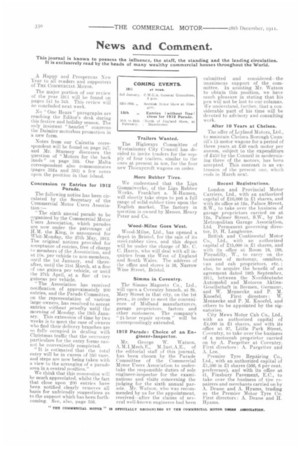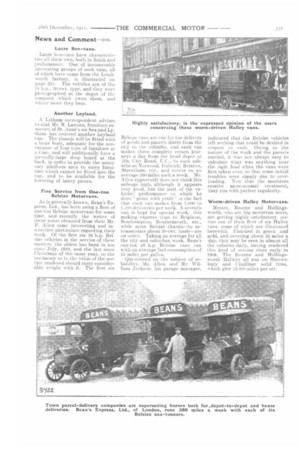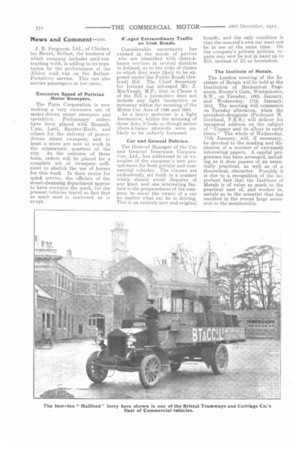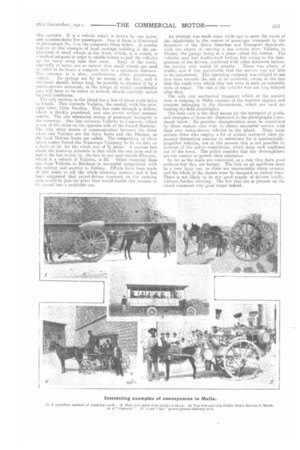News and Comment.
Page 10

Page 11

Page 12

Page 13

If you've noticed an error in this article please click here to report it so we can fix it.
This journal is known to possess the influen he ce, t staff, the standing and the leading circulation.
i It s exclusively read by the heads of many wealthy commercial houses throughout the World.
A Happy and Prosperous New Year to all readers and supporters of .TEE COMMERCIAL MOTOE.
The major portion of our review of the year 1911 will be found on pages 341 to 345. This review will ae concluded next week.
No"One Hears" paragraphs are reaching the Editor's desk during this festive and holiday season. The only insistent " hearlet " concerns the Daimler motorbus promotion in a, new form.
Notes from our Calcutta correspondent will be found on page 347, and Mr. Sturmey discusses the question of "Motors for the back lands" on page 355. Our Malta correspondent also communicates (pages 352A and 353) a few notes upon the position in that island.
Concession re Entries for 1912 Parade.
The following notice has been circulated by the Secretary of the Commercial Motor Users Association :— " The sixth annual parade to be organized by the Commercial Motor Users Association, which parades are now under the patronage of H.M. the King, is announced for Whit-Monday, the 27th May, 1912. The original notices provided for acceptance of entries, free of charge to members of the Association, and at 10s. per vehicle to non-members, until the 1st January, and thereafter, until the 31st March, at a fine of one guinea per vehicle, or until the 27th April, at a fine of two guineas per vehicle. "The Association has received notification of approximately 200 entries, and the Parade Committee, on the representation of various large owners, has resolved to accept entries without penalty until the morning of Monday. the 1511 January. This extension of time by two weeks is to meet the case of owners who find their delivery branches are so fully occupied in dealing with Christmas traffic that the necessary particulars for the entry forms cannot be conveniently completed.
"It is estimated that the total entry will be in excess of 350 vans, and steps are now being taken with a view to the arranging of a parade area, in a central position."
We think that this concession will he much appreciated, whilst the fact that close upon 200 entries have been notified clearly removes all basis for unfriendly suggestions as to the support which has been forthcoming. See, also, page 356. Trailers Wanted.
The Highways Committee of Westminster City Council has decided to invite tenders for the supply of four trailers, similar to the ones at present in use, for the four new Thornycroft wagons on order.
More Rubber Tires.
We understand that the Liga Gummiwerke, of the Liga Rubber Works, Frankfurt a. M-Hausen, will shortly take steps to put a full range of solid-rubber tires upon the English market. The factory in question is owned by Messrs. Henry Peter and Co.
Wood-Milne Goes West.
Wood-Milne, Ltd., has opened a depot in Bristol, for the sale of its steel-rubber tires, and this depot will be under the charge of Mr. C. C. Harris, who will deal with all inquiries from the West of England and South Wales. The address of the office and stores is 36, Narrow Wine Street, Bristol.
Simms in Coventry.
The Sinuns Magneto Co., Ltd., will open a Coventry branch, at St. Mary Street in that city, on the 1st prox., in order to meet the convenience of Midland manufacturers, garage proprietors, factors and other customers. The company's " 24-hour repair system " will be correspondingly extended.
1912 Parade Choice of an Engineer-Inspector.
Mr. George W. Watson, A. M. I.Mech.F.., M. Ins t. A. E. , of the editorial staff of this journal, has been chosen by the Parade Committee of the Commercial Motor Users Association to undertake the responsible duties of sole engineer-inspector for the examinations and visits concerning the judging for the sixth annual parade, Mr. Watson, who was recommended by us for the appointment, received-after the claims of several well-known engineers had been submitted and considered—the unanimous support, of the committee. In assisting Mr. Watson to obtain this position, we have much pleasure in stating that his pen will not be lost to our columns. We understand, further, that a considerable part of his time will be devoted to advisory and consulting work.
After 10 Years at Chelsea. The offer of Lcyland Motors, Ltd., to maintain Chelsea Borough Council's 15 motor wagons for a period of three years at /40 each motor per annum, subject to the expenditure of 2450 by the Council in moderniz ing three of the motors, has been accepted. This contract is an extension of the present one, which ends in March next.
Recent Registrations.
London and Provincial Motor Carriers, Ltd., with an authorized capital of £10,000 in 21 shares, and with its office at 1.2a, Palace Street, S.W., to take over the business of garage proprietors carried on at 12a, Palmer Street, S.W., by the Metropolitan Garage Association, Ltd. _Permanent governing director, I). H. Langhorne.
British and Continental Motor Co., Ltd., with an authorized capital of 215,000 in 21 shares, and with its office at Room 19, 199, Piccadilly, W., to carry on the business of motorcar, omnibus, van and cab proprietors, etc. ; also, to acquire the benefit of an agreement dated 19th September, 1911, between the Norddeutsche Automobil and Motoren AktienGesellschaft in Bremen, Germany, and W. Mennecke and P. M.
Knoef el. First directors : W. Mennecke and P. M. Knoefel, and others to be appointed by the signatories.
City Mews Motor Cab Co., Ltd., with an authorized capital of 24,000 in 21 shares, and with its office at 97, Little Park Street, Coventry, to take over the business of a motorcab proprietor carried on by A. Pargetter at Coventry. First directors : A. Pargetter and A. Lee.
Premier Tyre Repairing Co., Ltd., with an authorized capital of ,e1,500 in 21 shares (500, 6 per cent. preference), and with its office at 41, Finsbury Pavement, E.C., to Lake over the business of tire repairers and merchants carried on by A. Deane and A. Hyams, trading as the Premier Motor Tyre Co. First directors : A. Deane and H. Hymns.
Lacre Box-vans.
Lacre box-vans have characteristics all their own, both in finish and performanc:-... One of innumerable interesting groups of such vans, all of which have come from the Letchworth factory, is illustrated on page 351. The vehicles are of the 18lip., 30-cwt. type, and they were photographed at the depot of the company which owns them, and whose name they bear.
Another Leyland.
A Lytham correspondent advises us that Mr. R. Lawson, furniture remover, of St. Anne's-on-Sea:and Lytham, has ordered another Leyland van. The chassis will he fitted with a large body, adequate for the conveyance of four tons of furniture at a lime, and will additionally have a specially-large drop board at the back, in order to provide the necessary platform area to carry furniture which cannot be fitted into the van, and to be available for the lowering of heavy pieces.
Fine Service from One-ton Belsize Motorvans.
As is generally known, Bean's Express, Ltd., has been using a fleet of one-ton Belsize motorvans for some time, and recently the writer of these notes obtained from their Mr. P. Allen some interesting and instructive particulars regarding their work. Of the first six 16 h.p.
Belsjzc' vehicles in the service of these carriers, the oldest has been in use sinet, July, 1910, and the last since Christmas of the same year, so the testimony as to the value of the service rendered should carry considerable weight with it. The first six
Belsize vans are run for the delivery of goods and parcels direct from the city to the suburbs, and each van makes three complete return journeys a day from the head depot at 319, City Road, 'EC., to such suburbs its Norwood, Dulwich, Brixton, Streatham, etc., and covers on an average 380 miles each a week. Mn'. Allen apparently does not think this mileage high, although it appears very good, but the part of the vehicles performance to which he does " point with pride " is the fact hat each van makes from 1,000 10 Li00 deliveries per week. A seventh van is kept for special work, this making express trips to Brighton, Southampton, Bournemouth, etc., while more Belsize chassis—to accommodate about 30-cwt. loads—are on order. Taking an average for all the city and suburban work, Bean's one-ton 16 h.p. Belsize vans run with an average fuel consumption of 15 miles per gallon. Questioned on the subject of reliability. Mr. Allen. and Mr. William .Jackson. his garage manager, indicated that the Belsize vehicles left nothing that could be desired in respect to stich. Owing to the nature of the work and the parcels carried, it was not always easy to calculate what was anything near the right load when the vans were first taken over, so that some initial troubles were simply due to overloading. Now that the machines receive more-normal treatment, they run with perfect regularity.
Worm-driven Halley Motorvans.
Messrs. Bourne and Hollingsworth, who are big motorvan users, are getting highly-satisfactory service out of their fleet of six Halley vans, some of which are illustrated herewith. Finished in green and gold, and covering about 55 miles a day, they may be seen in almost all the suburbs daily, having rendered this kind of service since early in 1909. The Bourne and Hollingsworth Halleys all run on Shrewsbury and Challiner solid tires, which give 16,000 miles per set.
J. B. Ferguson, Ltd., of Chichester Street., Belfast, the business of which company includes mail-contracting work, is adding to its reputation by the performance of the Albion mail van on the BelfastPortaferry service. This van also carries passengers at low rates.
Excessive Speed of Parisian Motor Sweepers.
The Paris Corporation is now making a very extensive use of motor-driven street sweepers and sprinklers. Preliminary orders have been placed with Renault, tine, Latil, Sautter-Harle, and others for the delivery of powerdriven street sweepers, and at least a score are now at work in the aristocratic quarters of the city, As the outcome of these tests, orders will be placed for a complete set of sweepers—sufficient to abolish the use of horses for this work. In their desire for quick service, the officials of the street-cleansing department appear to have overshot the mark, for the present vehicles travel so fast that as much mud is scattered as is swept.
A"..eged Extraordinary Traffic on Irish Roads.
Considerable uncertainty has existed in the minds of parties who are identified with chars-itbanes services in several districts in Ireland, as to the risks of claims to which they were likely to be exposed under the Public Roads (Ireland) Bill. The Chief Secretary for Ireland has informed Mr. J. MacVeagh, M.P., that in Clause 8 of the Bill a locomotive does not include any light locomotive or motorcar within the meaning of the Motor Car Acts of 1896 and 1903.
As a heavy motorcar is a• light locomotive, within the meaning of those Acts, it looks as though motor chars-à-bancs interests were unlikely to he unfairly harassed.
Car and General Policius.
The General Manager of the Car and General Insurance Corporation, Ltd., has addressed to us examples of the company's new prospectuses for both private and commercial vehicles. The clauses are undoubtedly set forth in a manner which should avoid disputes of any kind, and one interesting feature is the preparedness of the company to cover the owner of a car no matter what car he is driving. This is an entirely new and original
benefit, and the only condition is that the assured's own car must not be in use at the same time. On the company's private policies, repairs may now be put in hand up to
instead of Lo as heretofore.
The Institute of Metals.
The London meeting of the Institute of Metals will be held at the Institution of Mechanical Engineers, Storey's Cate, Westminster, S.W., on Tuesday, 16th January, and Wednesday, 17th January, 1912. The meeting will commence on Tuesday afternoon, when the president-designate (Professor W. Gowland, F.R.8.) will deliver his inaugural address on the subject of"Copper and its alloys in early times." The whole of Wednesday, 17th January, will, if necessary, be devoted to the reading and discussion of a number of extremely interesting papers. A capital programme has been arranged, including as it does papers of an essentially practical, as well as of a theoretical, character. Possibly it Is due to a recognition of the important fact that the Institute of Metals is of value as much to the practical user of, and worker in, metals as to the scientist that has resulted in the recent large accession to the membership. this carrozin. It, is a vehicle which is drawn by one horse, and accommodates five passengers. One of them is illustrated in photograph No. 4 on the composite block below. A notable feature of this example of local carriage building is the employment of small wheels in the front, which, it is stated, is a method adopted in order to enable horses to pull the vehicles up the many steep hills that exist. Many of the roads, especially in town, are so narrow that small wheels are used in order to facilitate a complete lock in a minimum distance. The carrozin is a. slow, cumbersome, albeit picturesque,
vehicle. Its springs are by no means of the best, and it obviously should, before long, be possible to displace it by a public-service motorcab, in the design of which considerable care will have to be taken to embody details carefully suited for local conditions.
The only railway in the island has a line of about eight miles in length. This connects Valletta, the capital, with the principal town, Citta Vecchia. This line runs through a district which is thickly populated, and also serves several summer resorts. The one remaining means of passenger transport is the tramway. One line connects Valletta to Cospieua, which is one of the cities on the opposite side of the Grand Harbour. The only other means of communication between the three cities and Valletta are the ferry boats and the Dhaisas, as the local Maltese boats are called. The competition of these latter routes forced the Tramways Company to f x its fare on a basis of Id. for the whole run of 3; miles. A curious fact about the tramway schedule is that while the run from end to end of the line is only is., the fare to any part outside Floria.na, which is a suburb of Valletta, is 2d. Other tramway lines run from Valletta to Birchara in successful competition with the railway and another to Zeblong. Efforts have been made of late years to sell the whole tramway system, and it has been suggested that petrol-driven tramcars on the existing rails would he just the plant that would enable this concern to lie turned into a profitable ono.
An attempt was made some while ago to meet the needs of the inhabitants in the matter of passenger transport by the formation of the Motor Omnibus and Transpnrt Syndicate, with the object of running a bus service from Valletta to 6liema, the garage being at a place called the Gzeira. The vehicles used had double-deck bodies, but owing to the inexperience of the drivers, combined with other deterrent factors, the service only lasted 14 months. There was plenty of traffic, and it was regrettable that the service was not able to be maintained. The operating company was obliged to use iron tires towards the end of its existence, owing to the fact that the roads over which they ran were in such an execrable state of repair. The end of the vehicles was not long delayed after that.
The only real mechanical transport which at the present time is miming in Malta consists of the traction engines and tractors belonging to the Government, which are used for hauling the field searchlights. The mule cart is the chief means for the transport of goods, and examples of these are illustrated in the photographs reproduced below. Hs peculiar characteristics must be considered by those makers who wish to obtain successful service with their own motor-driven vehicles in the island. Many large private firms who employ a lot of animal transport. have expressed themselves anxious to substitute for it mechanicallypropelled vehicles, but at the present this is not possible on account of the police restrictions, which keep such machines out of the town. The police consider that the thoroughfares are too narrow to permit their admission.
So far as tho roads are concerned, as a rule they have good surfaces but they are bumpy. The lock on all machines must be a very large one, as there are innumerable sharp corners, and the whole of the chassis must be designed on furrow There is not likely to be any good supply of drivers locally, without further training. The few that are at present on the island command very good wages indeed.




















